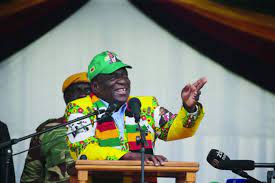News / National
Zimbabwe military pressures Mnangagwa to retire?
05 Jul 2024 at 10:52hrs |
0 Views

President Emmerson Mnangagwa's recent announcement that he will retire in 2028, in accordance with Zimbabwe's national constitution, was prompted by mounting military pressure and internal power struggles within Zanu-PF following the sidelining of the army in the 2023 elections. Despite his supporters' efforts to extend his tenure beyond 2028, Mnangagwa affirmed in Mutare that he will adhere to constitutional limits, though internal party factions continue to advocate for his prolonged stay.
After last year's elections, where intelligence-backed groups marginalized the military's influence, figures like Deputy General Constantino Chiwenga and Zimbabwe National Army commander Lieutenant-General Anselem Sanyatwe emerged to influence succession plans within Zanu-PF. The military, historically pivotal in Zimbabwean politics, seeks to reclaim control over succession, insisting that Mnangagwa, installed through a 2017 coup, must step down by or before 2028.
Amidst economic hardships and growing discontent among youth due to unemployment and corruption, military leaders and even some within Zanu-PF argue that Zimbabwe urgently needs new leadership. Mnangagwa, previously expected to leave in 2023 as per the coup agreement, aimed to extend his tenure until the military intervened. Sanyatwe, loyal to Chiwenga, is now consolidating military influence for the post-2028 era, aiming for sustained Zanu-PF dominance under a new leader chosen through orchestrated "command voting."
Despite these maneuvers, concerns arise over their implications for democratic norms and constitutional governance in Zimbabwe. The military's historical role, from the liberation struggle to contemporary politics, underscores its enduring influence and its periodic interventions in electoral processes and leadership transitions. Mnangagwa's acquiescence to retirement reflects a delicate balance between political survival and military assertiveness, reminiscent of Zimbabwe's tumultuous political history under successive regimes.
As Zimbabwe navigates these internal power dynamics, the military's interventionist approach raises questions about the future of democratic institutions and the rule of law. Mnangagwa's decision to comply with retirement plans, albeit under pressure, contrasts with past leaders' resistance to military influence, highlighting ongoing challenges in Zimbabwe's political landscape.
After last year's elections, where intelligence-backed groups marginalized the military's influence, figures like Deputy General Constantino Chiwenga and Zimbabwe National Army commander Lieutenant-General Anselem Sanyatwe emerged to influence succession plans within Zanu-PF. The military, historically pivotal in Zimbabwean politics, seeks to reclaim control over succession, insisting that Mnangagwa, installed through a 2017 coup, must step down by or before 2028.
Amidst economic hardships and growing discontent among youth due to unemployment and corruption, military leaders and even some within Zanu-PF argue that Zimbabwe urgently needs new leadership. Mnangagwa, previously expected to leave in 2023 as per the coup agreement, aimed to extend his tenure until the military intervened. Sanyatwe, loyal to Chiwenga, is now consolidating military influence for the post-2028 era, aiming for sustained Zanu-PF dominance under a new leader chosen through orchestrated "command voting."
Despite these maneuvers, concerns arise over their implications for democratic norms and constitutional governance in Zimbabwe. The military's historical role, from the liberation struggle to contemporary politics, underscores its enduring influence and its periodic interventions in electoral processes and leadership transitions. Mnangagwa's acquiescence to retirement reflects a delicate balance between political survival and military assertiveness, reminiscent of Zimbabwe's tumultuous political history under successive regimes.
As Zimbabwe navigates these internal power dynamics, the military's interventionist approach raises questions about the future of democratic institutions and the rule of law. Mnangagwa's decision to comply with retirement plans, albeit under pressure, contrasts with past leaders' resistance to military influence, highlighting ongoing challenges in Zimbabwe's political landscape.
Source - online
Join the discussion
Loading comments…




































